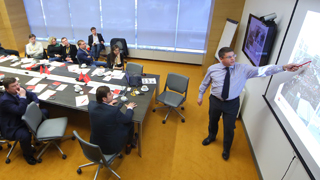
Dialogue social
Le dialogue social inclut les négociations, les consultations, les actions conjointes, les discussions et le partage d’informations impliquant des employeurs et des travailleurs. Un dialogue social satisfaisant est un outil essentiel permettant de façonner les conditions de travail, et qui implique toute une série d’acteurs à divers niveaux. Il équilibre les intérêts des travailleurs et des employeurs, et contribue à la fois à la compétitivité économique et à la cohésion sociale.
Les débats politiques récents au niveau de l’UE ont, notamment depuis la crise de 2008, attiré l’attention sur l’émergence de nouveaux débats concernant la justice sociale, la démocratie, la qualité du travail, ainsi que de nouveaux modèles de relations du travail, débats qui remettent en cause les modes traditionnels de relations industrielles et de dialogue social.
Trente ans après l’instauration historique du dialogue social européen à Val Duchesse (Bruxelles), la Commission a relancé le processus d’un nouveau départ pour le dialogue social, lors d’une réunion de haut niveau réunissant le 5 mars 2015 les organisations de partenaires sociaux de toute l’Europe. Le dialogue social européen est un instrument de la politique sociale de l’UE, qui contribue directement à l’élaboration de la législation et des politiques de l’UE dans le domaine du travail.
- Initiative de la Commission européenne: Un nouveau départ pour le dialogue social
- Article du blog d’Eurofound: De Val Duchesse à Riga: comment relancer le dialogue social?
















